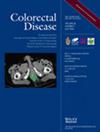Local excision for T1 rectal cancer: A population-based study of practice patterns and oncological outcomes
Abstract
Aim
Local excision (LE) for T1 rectal cancer may be recommended in those with low-risk disease, while resection is typically recommended in those with a high risk of luminal recurrence or lymph node metastasis. The aim of this work was to compare survival between resection and LE.
Method
This was a population-based retrospective cohort study set in the Canadian province of Ontario. Patients were individuals with T1Nx rectal cancer between 2010 and 2014 and demographics, disease characteristics, treatments and outcomes were determined using linked administrative databases. This study does not include clinical information regarding individual patient treatment decisions. The main outcome measure was overall survival (OS).
Results
A total of 719 patients were identified, including 359 with upfront resection, 113 with LE and immediate resection (<90 days) and 247 with LE with definitive intent. The majority of LEs were performed via colonoscopy. Piecemeal excision (42% vs. 49%, p = 0.28) and positive margin (50% vs. 77%, p < 0.01) rates were high in both LE groups, with the highest rate in those with immediate resection. The prevalence of poor differentiation (<5%, p = 0.70) and lymphovascular invasion (LVI) (14%, p = 0.80) was similar across groups. In those with LE with definitive intent, 21% ultimately underwent resection (median 150 days, interquartile range 114–181 days) and 4% received radiation. There was no difference in 5-year OS between groups (resection 83.2% vs. LE and immediate resection 82.3% vs. definitive LE 83.3%; p = 0.33). Adjusted analyses demonstrated no association between approach and survival [definitive intent LE hazard ratio (HR) 0.97 (95% CI 0.70–1.35), LE and immediate resection HR 0.97 (95% CI 0.60–1.45), upfront resection HR 1 (Ref); p = 0.98]. Differentiation, piecemeal excisions and LVI were not associated with OS in the LE groups.
Conclusion
There were no observed differences in survival between those who underwent resection, LE and immediate resection and definitive intent LE. Although, these are observational data, they call into question the reflexive decision to offer radical resection for those with suspected T1 rectal cancer.


 求助内容:
求助内容: 应助结果提醒方式:
应助结果提醒方式:


